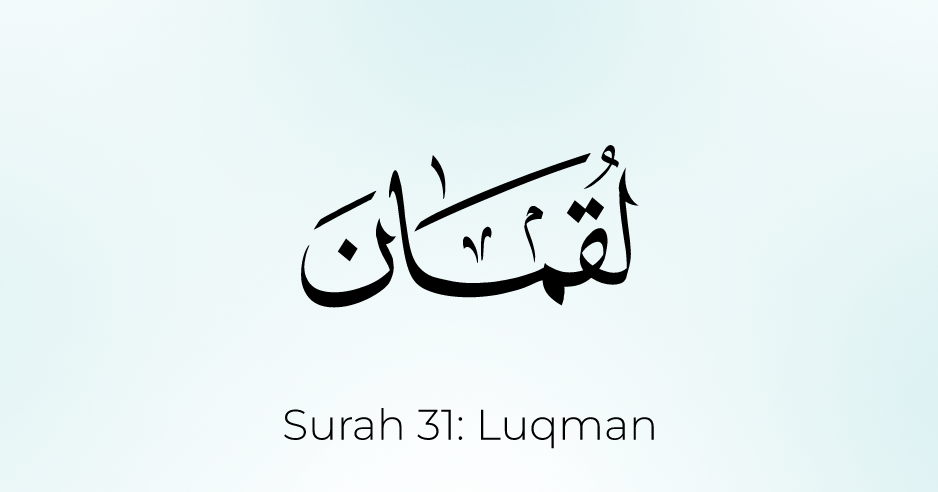Introduction
According to the Holy QUR’AN and historians, Hakim LUQMAN was a very wise man. His philosophical sayings were known to the people of his contemporary age and much after, and therefore had been profusely quoted by scholars and historians. His wisdom and sayings have been mentioned in the Holy QUR’AN and a Surah, named LUQMAN, has been named after him.
The Holy QUR’AN does not mention about his linage, family or place of his birth, but various historians have thrown some light and the same will be quoted. The sayings, as mentioned in the Holy QUR’AN will also be highlighted in subsequent paragraphs.
Lineage according to various historians and personalities
Ancient history describes the name of LUQMAN as a noble King who lived in the days of Second AAD (or AD); by descent he was Arab. IBN KASIR and SUHAILI have said that LUQMAN, the wise, was African and was brought to Arabia as a slave. He was the son of ANQA Bin SANDON or SAR Bin SANDON. He belonged to NAQA tribe of SUDAN. He was black, short in height, lips were thick and hands and feet were ugly. But he was very pious, a dedicated worshipper of ALLAH and was gifted with wisdom and foresight.
Some historians say that he was QAZI in the days of Hazrat DAUD-EI.
According to Hazrat ABDULLAH Bin ABBAS, LUQMAN was a Negro slave and a carpenter by profession. Hazrat JABIR Bin ABDULLAH stated that LUQMAN was short statured with thick lips and belonged to NOBA tribe.
Hazrat SAEED Bin MUSAYGAB said LUQMAN was Egyptian-Sudanese and his lips were thick. Though ALLAH had not endowed him with prophet-hood he was blessed with wisdom and foresight. A famous historian MUHAMMAD Bin ISHAQ wrote that LUQMAN HAKIM belonged to a famous Arabian tribe of AAD. He was a King and not a slave.
LUQMAN is referred to by some to the age of AAD (A’d) people who belonged to the prophet HOUD-EI. AAD was fourth in generation from NOAH, was a son of AUS the son of ARAM, the son of SAM, the son of NOAH-EI. The AAD people were tall and were great builders. Probably their sandy area was irrigated with canals excavated by them. The left the worship of ALLAH and oppressed their people. A three-year famine afflicted them however they took no warning. At last a terrible blast of wind destroyed their populated areas but some remnants (ruins) known as the Second AAD or THAMUD were saved and later suffered a similar fate for their sins.
According to WAHAB Bin MUMABBISH, on the death of SHADDAD BIN AAD his brother LUQMAN Bin AAD succeeded him. He was endowed with wisdom and understanding of a hundred persons. He was the tallest men in those days. According to WAHAB Bin MUNABBISH, Hazrat ABDULLAH Bin ABBAS used to say that lineage of LUQMAN Bin AAD was LUQMAN Bin AAD Bin AL MITAT Bin ALSALAK Bin VYLE Bin HAMEER. He was a prophet but not a messenger.
IBN JARIR and IBN KASIS and MUHAMMAD Bin ISHAQ also support the saying of Hazrat ABDULLAH Bin ABBAS.
According to a source LUQMAN was a keen observer of the blessings of nature and intimately watched the birds, flowers, trees and animals and tried to understand as to who had created the universe. One night while sleeping under a tree an angel told him that ALLAH wanted to bless him with a gift, either wisdom or prophecy. LUQMAN chose wisdom and when he awoke he felt that his senses and understanding had sharpened. He bowed down in humility and praised ALLAH for the marvelous gift.
According to yet another source, the man who had bought LUQMAN as his slave was kind because he had detected that LUQMAN was not an ordinary person. In order to test LUQMAN’s ability the master ordered him to slaughter a sheep and bring its worst parts. LUQMAN slaughtered the sheep and presented its heart and tongue to his master who understood that LUQMAN wanted to convey some deep meaning. After some days he ordered LUQMAN to slaughter a sheep and bring its best parts. LUQMAN again presented the heart and tongue to his master. His master asked LUQMAN how the heart and the tongue could be both the worst and the best parts? LUMAN replied, “The tongue and the heart are the sweetest parts if its owner is pure and if he is wicked, they too are as wicked.” Thereafter LUQMAN was held in great respect by his master and his wisdom spread all over the country. LUQMAN’s life is often associated with long life and his title is MU’AMMAR (the long lived). It is also said that he had refused worldly power and a Kingdom.

Sayings of Hazrat LUQMAN
As already mentioned above a Surah in the Holy QUR’AN has been named after him. But the way his penetrating sayings, wisdom and foresight have been mentioned in the Holy QUR’AN, the personality of LUQMAN gets glorified.
Surah LUQMAN is produced below:
12. We bestowed (in the past) Wisdom on Luqman: “Show (thy) gratitude to Allah”. Any who is (so) grateful does so to the profit of his own soul: but if any is ungrateful, verily ALLAH is free of all wants, Worthy of all praise.
13. Behold, Luqman said to his son admonishing him “Only Son! Join not in worship (others) with Allah for false worship is indeed the highest wrong doing.”
14. And We have enjoined on man (to be good) to his parents: In travail upon travail did his mother bear him and in years twain was his weaning: (hear the Command), “Show gratitude to Me and to thy parents: To Me is (thy final) Goal.”
15. “But if they strive to make thee join in worship with Me things of which thou hast no knowledge, obey them not; yet hear them with justice (and consideration), and follow the way of those who turn to Me; in the end the return of you all is to Me, and I will tell you all that ye did.”
16. “O my son!” (said Luqman), “if there be (but) the weight of a mustard seed and it were hidden in a rock, or (anywhere) in the heavens or on earth, Allah will bring it forth; for Allah is subtle and aware.”
17. “O my son! Establish regular prayer, enjoin what is just and forbid what is wrong: and bear with patient constancy whatever betide thee, for this is firmness (of purpose) in (the conduct of) affairs.
18. And swell not thy cheek (for pride) at men, nor walk in insolence through the earth; for Allah loveth not any arrogant boaster.
19. “And be moderate in thy pace and lower thy voice, for harshest of sounds without doubt is the braying of the ass”.
LUQMAN’s wise sayings were very well known in Arabia and were quoted by learned people and elders in meetings. The followers of the companions of the Holy Prophet (PBUH), the companions of the Holy Prophet (PBUH) and the Holy Prophet (PBUH) have been quoting the sayings of LUQMAN. A gist of his sayings is mentioned below:
1. Knowledge of foresight transforms a beggar into a King.
2. On joining some meeting first you should offer greetings and then sit down on one side. Unless you have listened to the conversation of the participants do not start speaking. If they are talking about the greatness of ALLAH do take part in it. If they are busy in useless talk, leave them and go to join the company of wise people.
3. When ALLAH grants trust to somebody it is the duty of the trustee to guard the trust reposed in him.
4. O Son! Be really afraid of ALLAH and do not feign to be God-fearing so that the people may respect you for it, when actually you are a sinner at heart.
5. O Son! Do not make an ignorant man your friend lest he should start thinking that you like his conversation soaked in ignorance and do not carelessly ignore the anger of a wise man lest he should separate himself from you.
6. Let it be clear that the tongues of wise men are charged with Divine power. None of them says anything unless ALLAH wants them to say so.
7. O Son! Do not feel sorry for silence. If speech is silver, silence is golden
8. O Son! Always remain aloof from wickedness and it itself will remain away from you because wickedness breeds wickedness.
9. O Son! Avoid anger and ire because intensity of anger deadens the hearts of wise men.
10. O Son! Be soft spoken and try to acquire eloquence by virtue of which you will become very popular among people as compared to a person who is all the time doling out charity among them.
11. Softness of temperament is the foundation of wisdom.
12. As you sow, so shall you reap.
13. Love your father and his friends.
14. Somebody enquired from LUQMAN, “Who is the most patient person?” LUQMAN said, “Whose patience is not backed by any harm.” It was again enquired “Who is the biggest scholar?” He replied, “The one who enhances his knowledge by learning from others.” It was again enquired from him, “Who is the best person?” He said, “A generous person.” The questioner again asked. “By generosity you mean someone who is the owner of riches?” He replied, “No, a generous person is one who if he tries to find goodness in himself, finds it otherwise. He should keep himself aloof from others.”
15. If was enquired from LUQMAN, “who is the worst human being?” He said, “The one who is mindful of the fact that he will be known as a bad person if he is found doing something vicious.”
16. O Son! It will be good if a good number of noble persons should enjoy your hospitality. You should seek counsel only from the scholars known for their integrity and forthrightness.
Was LUQMAN a slave or a King?
According to some historians and learned personalities LUQMAN was from humble origin, a negro slave with unpleasing looks. It is appropriate to deduce that a negro slave living under stress and strain, required obeying unflinchingly all commands of his masters and earning livelihood at the mercy of his masters, would not have gained philosophical knowledge, foresight or wisdom as is highlighted in the Holy QUR’AN. For the acquisition of philosophical knowledge, foresight and developing wisdom one has to learn from scholars and avail the company of learned and wise persons. His upbringing should also be under the guidance of dedicated parents well versed in etiquette and manners.
A negro slave, as mentioned above, would not have communicated advice and wise sayings to his slave son as highlighted in the Holy QUR’AN. It is therefore correct to assume that LUQMAN was brought up as a prince under the guidance of well groomed parents, learned tutors and scholars who eventually was crowned King.
LUQMAN was a follower of Hazrat HOUD-EI. He was a pious King of AAD II, a pure Arab by origin. In this connection the narration of MUHAMMAD Bin ISHAQ and evidence of SALMA Bin RABIA (a poet of the time of ignorance) are considered to be authentic and whatever was recorded on the inscription of AAD II (discovered in 18 A.H. contains – “We were ruled by such Kings who were far from mean thoughts and were executors of mischief mongers. They were born in accordance with the Shariat of HOUD-EI and good decisions were recorded in the book.”) has sufficiently proved that LUQMAN was a King.
Bibliography
1. The Holy QUR’AN – English translation of the meanings and commentary. Edited by the Presidency of Islamic Researchers – IFTA
2. Stories from the QUR’AN – By MAULANA HIFZ-UR-REHMAN SEVHARVI.




